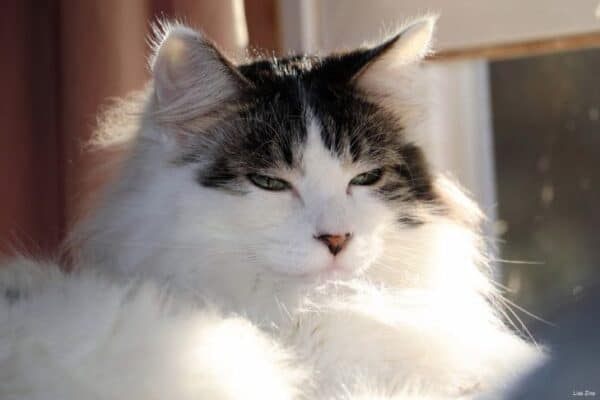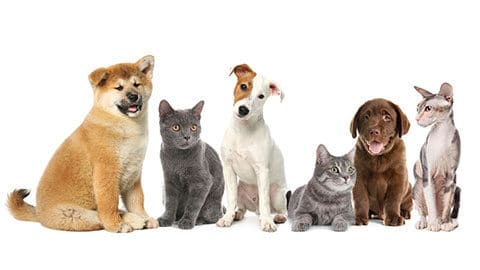
A New Year’s Resolution: Shed Your Cat’s Excess Baggage
[The first in a series of blogs about how to safely and successfully get your cat to lose weight]
Many people don’t even realize their cat is fat, because we’ve all become accustomed to seeing overweight cats with hanging bellies, brick-shaped bodies, and a skeleton so covered in extra pounds you cannot even feel the backbone or ribs when you stroke them.
This is a wake-up call to look at your kitty’s body with an objective eye and make changes in her diet (and afterward her lifestyle) to start shedding those extra pounds, which is the best holiday gift you can give her. Slimming down to a cat-appropriate weight will not only help extend your cat’s lifespan, but will also enhance her quality of life.
Is Your Cat “normal” weight or fat? A normal weight for an average house cat is 9-10 lbs. Many of our domestic shorthair cats are nearly twice that heavy. One of the saddest things we’ve done to our cats is turn them into butterballs. We’ve done this unintentionally by feeding dry food to kitties, whose digestive systems are not designed to digest a heavily carbohydrate diet and turn all the processed carbs of kibble (or “kitty crack,” as I call it) into fat.
An overweight cat is technically any cat who is above the average weight of 9 to 12 lbs for a male and 7 to 10 lbs for a female. That is the healthy and “correct” weight for any cat, except the large breed cats (Maine Coon, Norwegian Forest Cat, etc).
Why Obesity is Especially Bad for a Cat
“Obesity” (defined as “being overweight”) is now classified by the American Veterinary Medical Association (AVMA) as a disease.
Cats who are more than a few pounds overweight can be labeled as “grossly obese” or “morbidly obese.” These very overweight cats’ weight loss has to be managed very carefully or can become life-threatening (see suggestions for slow and steady weight loss in my next blog).
Obesity is a disease that can lessen quality of life for a cat. A cat who is only a few pounds over those ideal weights can feel less well overall, whether from being less able to move around comfortably, less able to reach to clean themselves, generally lethargic and therefore less involved with their people, other animals and their environment. Depression can set in.
Obesity can cause other medical conditions (diabetes, kidney and urinary tract problems). Obesity can also shorten a cat’s lifespan because of the consequences.
Obese cats cannot reach their hind ends to groom themselves properly, and keeping themselves clean is central to a cat’s natural routine and well-being. Being unable to accomplish self-grooming can be stressful for a cat, and cause physical problems, too.
Does 5 lbs really matter that much?
It’s tempting to rationalize your cat being overweight by saying a few pounds one way or the other doesn’t really matter, then think about what five pounds means to a 10 pound animal.
Put this in the context of a human’s weight gain. If a cat is ideally supposed to be 10 lbs, but weighs 15 lbs, he is overweight by 50%. Compare that to a woman of 130 lbs becoming 195 lbs. It makes a huge difference in how the cat feels and his body can function. Every pound --- every ounce --- makes a difference.
Don’t Some Cats Just Tend to be Fat?
An overweight cat usually does not get that way due to some unique condition or an individual “genetic” problem.
Cats don’t naturally get fat when they eat a diet appropriate to their species (low carbohydrate, high protein, moderate fat, basically like a rodent, bird or lizard, their natural prey). If your cat is already fat or gains weight quickly, you need to take him/her to the vet for a check up and to rule out any medical condition that could account for the weight gain. Thyroid problems happen to cats later in life, but that usually causes a cat to lose weight, not gain it.
Cats don’t have “large bones,” a phrase that is one of the excuses people make for obesity in people.
People Make Cats Fat
We humans are the reason cats get fat. Unknowingly, people are making their cats too many calories of the wrong type of food: dry cat food, which is carbohydrate-rich, an unnatural ingredient for felines. Cats get fat when they are fed dry cat food, also known as kibble---which I dubbed “kitty crack” back when my radio show CAT CHAT was on the Martha Stewart channel of Sirius.
We are giving highly processed carbohydrates to obligate carnivores: creatures with a short digestive tract whose metabolisms are ideally intended to take in a mouse, digest it, expel it, and then have their system rest for as many as twelve hours before they should eat again.
Free-feeding kibble goes against a cat’s natural habits
Cats are hunters: they are hard-wired to stalk, chase, kill and eat small rodents, birds, lizards or even insects. They are naturally opportunistic eaters: they only eat when their hunt is successful, then they sleep it off. Cats are not “grazing animals” like cows, sheep or horses. Putting out bowls of kitty crack encourages cats to do something entirely unnatural --- “belly up to the bar” and just keep crunching away at the carb-rich kibble that can leave them hungrier than ever for quality protein. Free feeding also doesn't give the cat’s digestive system the necessary 12 or so hours it needs to rest after digesting.
For more information and a medical explanation for the whole topic of obesity) please see Dr. Elizabeth Hodgkins book “Your Cat” and my book “The Cat Bible: Everything Your Cat Expects You to Know.”
[Stay tuned for the next steps in effectively helping your cat to slim down.]
---Tracie Hotchner
(Have a comment? Share it on Facebook.)
photo credit: Lisa Zins "What should I knock off of the shelf to get her attention??" via photopin (license)

